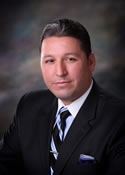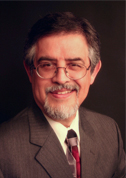© 2014 The Texas Lawbook.
By Natalie Posgate
Staff Writer for The Texas Lawbook
(January 9) – Jeronimo Valdez’s law office voicemail is standard: “Hi, I’m not here, leave me a message and I’ll get back to you.” But before the beep, clients hear the greeting again – this time, in Spanish.
A business litigator in Dallas, Valdez’s key commodity to success is his ability to communicate fluently in Spanish, as 60 percent of his clients are Latino businesses and business leaders.
“There is a huge market for business lawyers in Dallas who speak Spanish,” said Valdez, who is the chairman of the board of directors at the Greater Dallas Hispanic Chamber of Commerce. “I am shocked that nobody has taken advantage of this market.”

A new study published last month by two Dallas researchers shows that attorneys in town are missing out on big bucks because they don’t have relationships with Hispanic business leaders and one primary reason is because those lawyers don’t speak Spanish.
On the flip side, local Hispanic businesses are hurting as well because they don’t have access to the legal services they need.
The report, called “Legal Watch Dallas 2014,” says Hispanic business leaders have potentially hundreds of millions to even billions of dollars in legal needs that are mostly going unmet because Dallas County lawyers are not focused on doing what it takes from business and cultural standpoints to attract them as clients.
Dallas psychologist Dr. Edward Rincón and litigation consultant Dr. Kevin Karlson interviewed 400 Dallas County Latinos and found that while Latinos had a growing need for legal services, lawyers are doing a subpar job of marketing their practices to the Hispanic community. They note that very few Dallas lawyers speak Spanish and even fewer promote their legal practices in venues where Latinos would learn about them.
The study also found that:
• 43 percent of Latinos said they believed they or a family member would need the services of a lawyer in the next year to help them with an important contract;
• 29 percent said they would need legal advice during the next year to incorporate their new business and other legal work related to a business start up;
• 23 percent would need legal advice related to a job discrimination issue;
• 14 percent would need legal assistance obtaining a patent or trademark; and
• 14 percent said they might need help with a business bankruptcy issue.
Yet when asked what they would do if they needed legal advice today, less than half of the respondents said they’d hire a lawyer. Nearly 31 percent said they would talk to a friend or family member first, 12 percent said they would consult a website such as LegalZoom.com and 9 percent said they would visit a legal clinic.
“There’s an opportunity out there for [attorneys] to serve Latino businesses… that need transactional services and they’re not being met,” Karlson said. “The barriers to serving them are in the legal community.”

The University of Texas at San Antonio reports that Hispanics will represent nearly 70 percent of the Dallas community by 2050.
The report pointed out that in 2012, Latino households in Dallas County earned an aggregate income of $11.5 billion, which represented 19 percent of the area’s total aggregate income of $59 billion.
“This is not a strictly pro bono community,” Rincón said. “There are substantial dollars being earned by the Hispanic community.”

Valdez agreed that this could be a misperception among business lawyers.
“I don’t think they realize just how many Hispanic business owners there are,” he said. “And I’m not talking about the mom and pop shops, tortilla factories, or tamale houses; I’m talking about legitimate $100 million revenue companies that have company executives or owners who are Hispanic.”
Though not the main factor, Rincón and Karlson said one of the reasons for Dallas lawyers’ inability to access Hispanic business stems from the lack of Hispanic lawyers in the legal community.
The report mentioned the 2011-2012 Dallas County Attorney Statistical Profile by the State Bar of Texas, which revealed that there were only 602 Latino attorneys in the area, which represents only 4 percent of the total 15,200 attorneys in Dallas. This translates to a ratio of one Latino attorney for every 1,036 Latino adults. By comparison, the ratio for non-Latino attorneys to non-Latino adults is one to 72.
While increasing the number of Hispanic lawyers in Dallas is an important goal for improving diversity in the legal community, the survey showed that it didn’t matter one way or the other whether Hispanics preferred to hire a fellow Hispanic for legal services. Only 48 percent of the respondents said that it was important for the attorney to be Hispanic.
Rincón, Karlson and Valdez concurred that the ability to communicate with the client in Spanish was far more important than the ethnicity itself.
Though he did not know of an existing official statistic, Rincón estimated through his interactions with Latino attorneys in Dallas that roughly 30 percent – maybe less – can communicate well in Spanish. But in terms of being fully bilingual and having the ability to read, write and explain legal terms in Spanish, the number is likely closer to 10 percent, he said.
Rincón pointed out that having a proficiency in Spanish is important to the foreign-born Latinos in the community, since 90 percent of them are Spanish language-dominant and prefer to communicate in Spanish when provided the choice. Two-thirds of the Hispanic community in Dallas is foreign-born, he said.
Attorneys who cannot communicate well in Spanish often hire staff with this skill set, Rincón added.
Valdez said hiring staff proficient in Spanish is part of the solution to helping business lawyers reach the Hispanic community. Many clients will be satisfied if they are at least able to communicate with the firm’s Spanish-speaking staff.
But working solely with the staff won’t cut the mustard when the Hispanic business owners themselves get involved, Valdez said, because they will need to speak directly to the lawyer to effectively make decisions about the extra complicated legal matters at hand.
For the lawyers who don’t speak Spanish, that’s where they will run into problems, Valdez said.
Another solution to reaching Hispanic clients is joining local organizations such as the Hispanic Chamber of Commerce and the Regional Hispanic Contractors Association. Valdez said Hispanic business owners constantly contact those organizations looking for lawyers as well as financial advisors, CPAs and other professionals to help them with their business needs.
Valdez doesn’t foresee the larger law firms as potential recipients of Hispanic businesses’ money because the firms already have plenty of revenue (and their prices are too high for most of the Hispanic business revenues). But a real potential lies in the smaller firms that have 10 to 50 attorneys whose hourly rates run at $300 rather than $500-plus, he said.
Current lawyers aside, a major sector of the legal community that could significantly contribute to improving the delivery of services to Hispanics lies in the very places that train these future lawyers: law schools.
Given the changing nature of lawyers’ business models, Rincón said he is surprised law schools do not require any marketing classes for students to obtain their juris doctorates.
But if that never happens, Rincón said law schools could still greatly benefit their students if they began offering curriculum or coursework to teach their students about the communities they will be serving. If law schools do this, the future lawyers will be better equipped on how to reach potential customers in their area, he said.
If anything, Rincón hopes to change the diversity of thinking in the legal community through this study.
“I do think that we can really make some inroads of thinking about Latinos,” Rincón said. “You don’t need to be Hispanic or speak Spanish to recognize something. You just need to know the right things that are going to lead to a better outcome.
“Just because an industry behaves a certain way doesn’t mean it will always continue.”
For more information about this study, visit www.rinconassoc.com/legalwatch
© 2014 The Texas Lawbook. Content of The Texas Lawbook is controlled and protected by specific licensing agreements with our subscribers and under federal copyright laws. Any distribution of this content without the consent of The Texas Lawbook is prohibited.
If you see any inaccuracy in any article in The Texas Lawbook, please contact us. Our goal is content that is 100% true and accurate. Thank you.
